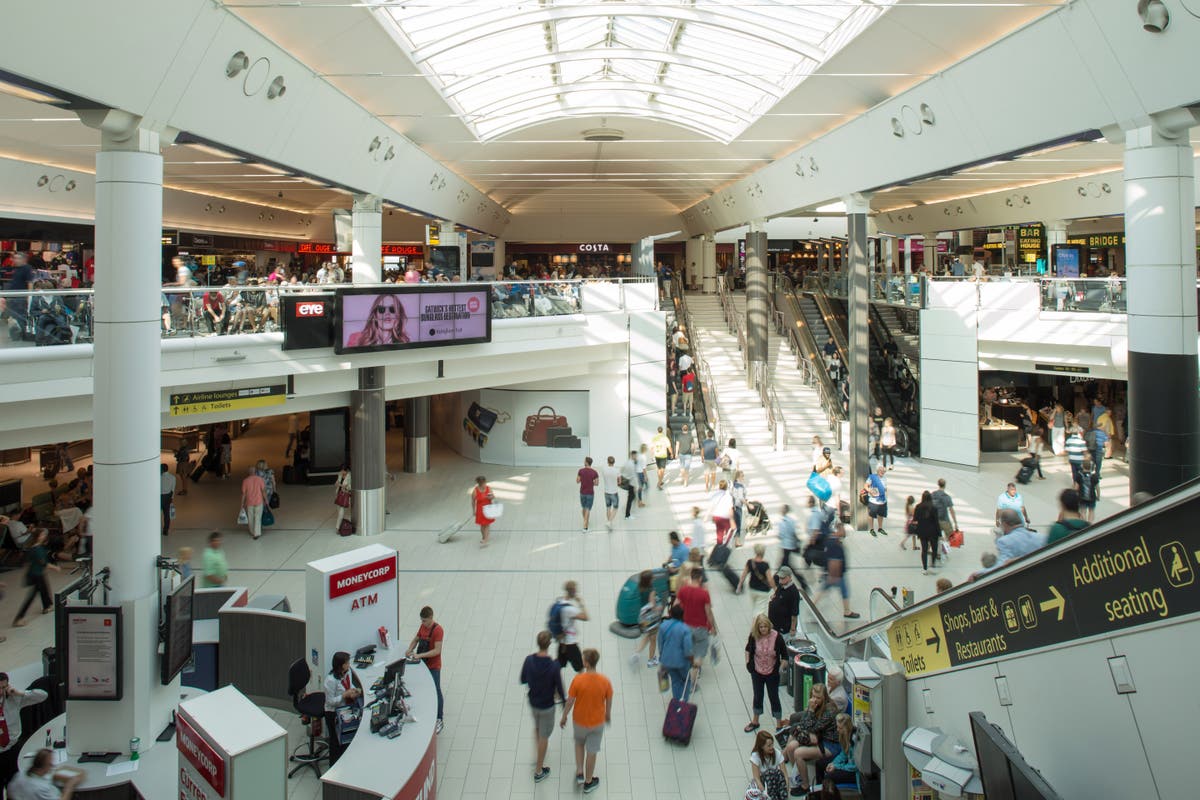Your latest international travel questions answered by expert Simon Calder
What are the prospects for easier travel restrictions for France, the US, Morocco and China?

In late March in the average year, the travel correspondent of The Independent is normally to be found at a waterside bar in Stockholm, often in the company of one or two members of Abba, commemorating St Catherine of Sweden. Each spring, her passing on 24 March 1381 is marked annually; sadly, she was not Bjorn again.
As Easter approaches, Simon Calder took an hour out of his far-from-busy schedule to tackle readers’ travel questions.
French leave
Q: Do you think France is likely to ease its entry rules in the next few weeks for all passengers?
Celine P
A: I think there is a good chance. France is heavily dependent on UK tourism; it is our second-favourite overseas country after Spain, and the past nine months or so have been infuriating for anyone hoping to get there.
First the UK scuppered the peak late-July/early August getaway with the ludicrous “amber plus” classification, imposing quarantine on all holidaymakers returning from France in a bungled attempt to defend against an almost non-existent variant of concern of Covid.
Then the government in Paris wilfully destroyed holidays over Christmas and New Year with a blunt travel ban that was a ridiculous overreaction to the spread of the Omicron variant.
So there is plenty pressure from the travel industry to open things up.
Even in the 10 weeks since the French veto on fully vaccinated British visitors was lifted, the rules for travellers have shifted significantly. Pre-departure tests and online passenger locator forms are no longer required, but you still need to make a sworn statement (intriguingly addressed to the Ecology Ministry) confirming your absence of Covid-19 symptoms and contact with cases.
The definition of fully vaccinated, by the way, requires travellers aged 18 and over either to have had their initial vaccine course within the past nine months, or to have received booster (no time limit).
Unvaccinated travellers are really not welcome. Only those with a “compelling reason” (normally strong family links) can apply, and they must present a pre-departure test.
Yet increasingly many European nations, including the UK, are following the decisions by Hungary and Ireland to open up without restrictions.
In short order, I expect the major tourist nations to remove or at least ease significantly their complicated and onerous rules. Having said that, the first round of the French presidential election is on 10 April 2022. As, sadly, we have learnt over the past two years, travel bans are often electorally popular. So perhaps nothing will happen until after Easter.
Ferry annoying
Q: P&O’s Hull-Rotterdam operation is currently curtailed, and the general warning is “don’t travel unless essential”. So what will happen if I turn up at the port to travel to my essential (to me and my family) ski holiday?
Is the ferry firm putting people on some other alternative crossing? And if not, how do I get my money back as soon as possible so that I can make other arrangements?
Nick Young
A: On 17 March P&O Ferries made 800 seafarers redundant, intending to replace them with cheaper agency staff. The company has repeatedly said that the decision – which contravened rules on consultation about job cuts – was the only alternative to closure.
While sailings are continuing between Liverpool and Dublin, a route already crewed by workers on lower-pay contracts, resuming service from Dover, Cairnryan and Hull is proving slower.
The company insists it is hoping to resume sailing at scale as soon as possible, but the standard message I have seen from P&O Ferries is basically the same as it has been for the past week: “Tonight’s Pride of Hull service from Rotterdam to Hull is suspended. We apologise for the inconvenience caused. Those with essential travel needs will be guided by our port teams.”
That last line suggests you might usefully turn up at the port, just east of Hull city centre. Please don’t: instead, choose between the DFDS Newcastle-Amsterdam and Stena Line Harwich-Hook of Holland link, or one of the short-sea crossings from Kent. Buy a new ticket, then set about claiming the difference between what your original ticket cost and the extra you had to spend, whether on the crossing or extra fuel.
P&O Ferries is offering straight refunds for trips that could not be made. But ferry passengers’ rights rules go beyond that: if a sailing is cancelled for any reason, then the company responsible must enable the traveller to reach their destination in a reasonable time frame.
For Dover-Calais that is easy at the moment: customers simply turn up at the DFDS control point and are given space on the next available sailing. But on other affected routes, the passenger has to make suitable arrangements and then send in the bill. Be prepared for it to be a slow process – especially if the unfortunate and unintended impact of government measures to force P&O to make a U-turn is that the ferry firm closes down..
Q: I’m booked with P&O Cairnryan to Larne in the middle of May. Am I best booking with Stena Line on this route in case P&O abandon this route?
Dave S
A: European Causeway, one of the two P&O Ferries vessels on the link between southwest Scotland and Northern Ireland, is currently detained in the port of Larne because of safety concerns. But P&O Ferries is still planning to resume sailings on the route.
At this stage I would stay with your existing booking.
Sun seekers
Q: My wife suddenly craves some family sunshine. She doesn’t want to overthink it (which I always do) and said to me: “I miss the days of Teletext deals. I wish they still existed”. A decent cheap deal, a dash to the sun, some family fun. Help! What’s the modern equivalent?
CB
A: Just book a proper package holiday with a good operator such as Tui or Jet2. If you can travel out on 30 March, I recommend Tui from Gatwick to Malaga, with a week’s stay at the Myramar Fuengirola Hotel on the Costa del Sol – an easy train ride into that fabulous city. Just £245 per person right now.
Jet2 has similarly attractive options. These include flights (with luggage), transfers and room-only accommodation.
Positive thinking
Q: I was due to fly to St Lucia on 9 April. I have had a positive LFT this morning. I’m wondering whether I might still be able to go? And whether I need to get a PCR now to prove I could have recovered in time? Or is there a way to prove I’ve had it and recovered that might be accepted?
Miss C
A: Tricky. First, I hope you are feeling well despite the infection. Next, I suggest you talk to your holiday company/airline and the St Lucia High Commission to see what they say.
I have heard of a fair number of travellers testing negative on PCRs even 10 days after their first positive lateral flow test, so not all is lost.
American predictions
Q: How long do we believe the US will still require any form of Covid proof to get in? Is it still valid to get in using a doctor’s note as I recently had Covid?
Funky Si
A: The US government has been slow in removing travel restrictions and I detect no great motivation to accelerate that. Optimistically, rules may be eased in May or June; realistically, September or October is more likely.
A recent Covid recovery letter is acceptable only as an alternative to a pre-departure test, not as an alternative to being fully jabbed.
The health regulator, the Centers for Disease Control, says: “You must be fully vaccinated with the primary series of an accepted Covid-19 vaccine to travel to the United States by plane if you are a non-U.S. citizen.
“You are required to show a negative Covid-19 test result or documentation of recovery from Covid-19 when you travel to the United States by air.”
Q: Do you have a view on why the USA are so slow to drop pre testing? Lots of major destinations have already done it.
S Bart
A: Basically: compared with other nations, the US is extremely rich and not especially dependent on international tourism.
As mentioned earlier, the American government has been slow in removing travel restrictions and I detect no great motivation to accelerate that. Optimistically, rules may be eased in May or June; realistically, September or October is more likely.
South Africa
Q: Is a PCR test still required to enter South Africa? The UK government says it is but the British Airways website says it isn’t. Help.
Anonymous
A: Do not rely completely on either of those sources to inform you of any country’s Covid-19 travel restrictions.
In a fast-changing world, the Foreign Office does what it can to keep up to date, while airlines have dozens of staff deployed in a constant battle to ensure that they reflect the latest rules for the nations they serve.
Carriers have three added complications:
So airlines face a lot of pressure to get decisions right. But ultimately the only thing that counts is the official policy of the country involved. So I always seek the latest entry requirements from the tourism organisation for my destination.
South Africa Tourism tells me its current rule is simply “jab or test”. For fully vaccinated arrivals, that means proof of vaccination upon entry (though in practice the airline will always check that you have it before you are allowed on board).
For unjabbed travellers, it’s a negative PCR test, with the swab having been taken within 72 hours – though annoyingly there is no clarity whether that is before arrival in, or departure to, South Africa. Best to assume the former; always err on the side of caution.
Finally, South Africa Tourism adds you must complete the “traveller health questionnaire” upon arrival.
Moroccan motivation
Q: Do you think Morocco will drop the need for PCRs for vaccinated travellers in time for Easter?
Maggie
A: Oh, Morocco: a wonderful north African nation with some very curious Covid-19 policies. I was hoping to head south to Tangier, Casablanca and Marrakech in October 2020, with a flight booked and all, but instead my trip went figuratively south as the coronavirus pandemic spread. My colleague Helen Coffey made it there by train and ferry last autumn, but shortly afterwards the borders closed to British visitors.
The October 2021 travel ban was sudden (just days before the main half-term week for families in England and Wales) and uncompromising, with direct flights between the UK and Morocco suspended and airlines ending up trying to send out empty planes to bring people back – with some of those turned back en route.
At the time I spoke to Zina Bencheikh, managing director of adventure operator Intrepid Travel in Europe, who said the decision would be “particularly devastating for local people in Morocco who rely on tourism for their livelihood”.
The travel ban remained in place for months, until 7 February, to be replaced by a pretty hard-line requirement for a PCR test within 48 hours before departing for Morocco – even for fully vaccinated and boosted travellers. Morocco’s rules are stricter for jabbed visitors than Tunisia’s are for unvaccinated travellers.
The health ministry in the capital, Rabat, is definitely outplaying the tourism ministry. Hopefully, once the government sees how much business is being lost to other destinations, they will ease their onerous and expensive rules.
Chinese walls
Q: When you think China will ease its border restrictions? My son is living and working there. We have not seen him since 2019. My understanding is that whilst he could return to the UK, if he did so he would then not be able to return to China and continue working there.
Alison J
A: China, including Hong Kong, is increasingly at odds with the rest of the world over its attitude to international travel in the era of Covid-19. For two year the People’s Republic has maintained a near-total travel ban.
While even New Zealand has said it will open up in May, there is no sign of the China doing the same any time soon.
But I do know of Westerners working in China who have left for family visits to the UK and then successfully returned to their jobs – after enduring a lot of testing, paperwork and uncomfortable hotel quarantine. One small light in the gloom: I have just heard from a colleague in Hong Kong that the mandatory hotel quarantine for returning residents is to be reduced to only a week from April. So perhaps things will ease soon.
Spanish practices
Q: Has Spain scrapped its passenger locator form?
Hell40
A: I wish! I hope I am wrong, but I see no sign of an end to the Health Control Form (known as an FCS) that the Spanish government has implemented “to protect the general public’s health”. It’s a faff to fill in, with some email to-ing and fro-ing, but by no means as onerous as the now-scrapped UK passenger locator form.
German grumble
Q: I booked to fly to Germany last year with Lufthansa with my sister in business class last September/October. In the end she caught Covid-19 a few days before we went so couldn’t travel. She has tried to claim the cost of the flight back from her travel insurance and they have asked her for a “did not board” email/letter from Lufthansa.
I have sent two requests via their online facility which have never been replied to apart from getting a “thanks for the message” response.
I have been in contact with Lufthansa on Twitter. In a direct message they have stated that they have escalated the issue a number of times but can’t do anything more to get the to reply. Any advice?
Dave M
A: How frustrating: you need a simple but official statement, but it is proving maddeningly difficult to obtain.
First, did Lufthansa not offer anything in terms of flexibility, eg a voucher with a decently long expiry date? That would have saved you the bother of claiming.
Next, airlines like Lufthansa are great at flying people safely around Europe and the world but evidently not great at communicating on after-sales matters.
But I believe that if you can demonstrate to your insurer that you have tried, they should accept that – especially if you have any proof (photographic or administrative) placing you in the UK and not in Germany at the time of the trip.
If your insurer have no joy, contact the Financial Ombudsman Service, who are pretty good at looking into travel insurance issues where insurers do not appear to be as customer-friendly as they might.

 UsenB
UsenB 































